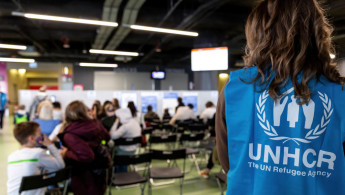UNHCR 'regrets' UK Lords' passing of Borders Bill, says refugees facing 'real suffering'
The United Nations' refugee agency criticised the passing of the UK Nationality and Borders Bill in the House of Lords on Wednesday, saying the legislation “undermines international refugee law”.
The controversial bill has previously faced several defeats in the Lords, as peers challenged clauses which differentiate asylum seekers based on their method of arrival and sought to ensure legislation complied with the 1951 Refugee Convention.
However, on Wednesday evening the upper house of the British parliament voted to pass the bill after hard-sought amendments were dropped.
The bill has now been handed back to the House of Commons, which has a Conservative majority that repeatedly supported the legislation.
The UNHCR said it “regrets that final amendments to the [bill] were rejected,” in a tweet on Wednesday.
UN High Commissioner for Refugees Filippo Grandi said: “It is disappointing that [the UK] would choose a course of action aimed at deterring the seeking of asylum by relegating most refugees to a new, lesser status with few rights and a constant threat of removal.”
UNHCR regrets that final amendments to the Nationality and Borders Bill were rejected.
— UNHCR United Kingdom (@UNHCRUK) April 27, 2022
The Bill will now become law.
The new law undermines established international refugee protection laws and practices and risks causing very real suffering to vulnerable people. pic.twitter.com/RMtXto8Ryq
The bill includes clauses that allow for indefinite detention, offshore processing and “pushbacks” in the English Channel.
The British government officially withdrew their “refugee pushback” policy ahead of legal challenges by refugee charities just this week. But, UK Home Secretary Priti Patel also stressed that nothing was “off the table” when it comes to migration policies.
The UK government has today ripped up the Refugee Convention - a longstanding international agreement. Priti Patel's racist Nationality and Borders Bill drags the UK's reputation through the mud.
— Amnesty UK (@AmnestyUK) April 27, 2022
https://t.co/WntIc78P1g
UK charities and rights groups, including The Refugee Council and Amnesty International, have slammed the Borders Bill for penalising asylum seekers.
“It truly is a bleak day for refugees fleeing conflict and persecution," said Amnesty's Steve Valdez-Symonds.
The rights group say the law will intensify the exploitation of vulnerable people and do little to create a fairer, safer system in which people fleeing war and prosecution can seek refuge in Britain.
The UK Home Office, however, told The New Arab that the bill “will fix [the] broken asylum system, helping those in genuine need while tackling people-smuggling gangs”.
The 1951 Refugee Convention stipulates that a refugee should not be returned to a country where they face serious threats to their life or freedom. This is now considered a rule of customary international law. UNHCR serves as the "guardian" of the 1951 Convention and its 1967 Protocol.





 Follow the Middle East's top stories in English at The New Arab on Google News
Follow the Middle East's top stories in English at The New Arab on Google News


